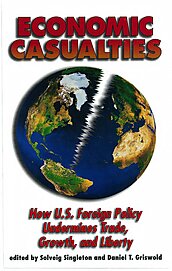In recent years economic sanctions have become one of the most frequently employed weapons in the U.S. foreign policy arsenal. They have been imposed in the name of advancing human rights, of fighting terrorism, and of preventing the transfer of weapons technology. Those are laudable goals, but the essays in this book lay out the evidence that sanctions are not effective instruments of foreign policy. Because they curb the freedom of Americans to trade and communicate with the rest of the world, sanctions have more disadvantages than benefits. Efforts to restrict the use of sanctions will soon be debated in Congress, and the results will affect every American consumer.
Contributors to this volume include former defense secretary Dick Cheney, former U.S. trade representative Clayton Yeutter, Prof. James B. Burnham of Duquesne University, Undersecretary for Export Administration William A. Reinsch, president and CEO of Novecon, Ltd. Richard Rahn, Ted Galen Carpenter of the Cato Institute,and Gary Hufbauer of the Institute for International Economics.
